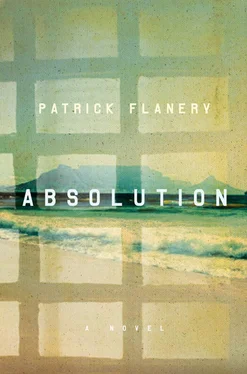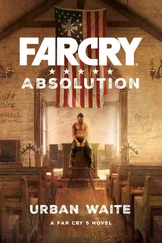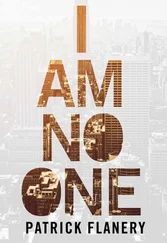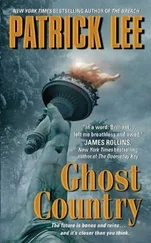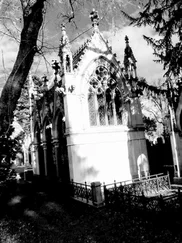The light was beginning to shift, and a hot breeze blew down from the interior, throwing sand against your burned body, and you began to feel chilled, wracked by the nausea of sunburn that comes when the light fails. The woman on your left and the friend on your right were also beginning to shiver and shake.
Is this where you end? Is this how you end?
It is my nightmare. I dream it every night, every hour, have dreamed it for two decades now.
It is all I can see.
Before I leave for Johannesburg tomorrow, Greg suggests a visit to my old neighbourhood. We stop first at the weekend market in the Old Biscuit Mill, jammed with hipster locals shopping for overpriced baked goods, handicrafts, African masks spray-painted matte white to make them look more chic. Alongside all that there are still the run-down shops on Albert Road, the car guards with manic arm motions insisting that it’s fine to park on a solid line because everyone does it and the traffic police don’t give a damn and anyway it’s a Saturday so what could happen?
At the market we sit on hay bales and eat while Dylan plays with some other children. Greg seems to know everyone and after two hours of eating and playing and squeezing through the crowds to buy vegetarian wraps and pastries and iced coffees I tell him I’m going to look for my old house and will meet them later.
I dodge through the cars on Albert Road and with the map in my head walk back towards the City Bowl; after a few blocks I turn up Dublin Street, cross Victoria, and turn off onto Kitchener.
Devil’s Peak looms above, though it doesn’t seem as massive as I remember it. And while the street hasn’t changed much in two decades, it feels narrower, cramped and enclosed. Some of the houses are more dilapidated than they once were, others look like they’ve been recently refurbished, repainted and encased in burglar bars that enclose the front verandas. Kwaito pulses from one of the shabbier houses. Further up the hill, from a house with a new extension built above the original one-storey structure, there’s the sound of a string quartet coming from a stereo, the windows all thrown open and the curtains limp with heat fluttering out through the bars.
I thought I would recognize the house without having to look for the number, but before I know it I’m at the intersection with Salisbury and have to retrace my steps to the house with the new extension, and then I see that they’ve knocked together our old house with the one next door. Both used to be white but the new structure is painted dark grey with black trim and has a glass and steel cube jutting out of the top in place of the original pitched roofs. There’s a new gate and the whole front porch has been caged in burglar bars cast in geometrical patterns. Through the open windows I can see the interior: the walls have been painted the colour of blood, the ceiling clad with bamboo, Congolese masks hang on the walls — ‘hectic, bad magic’, Greg would say. A woman in one of the front rooms watches me through the window.
Three boys on bicycles ride past, shouting to one another. A cat runs across their path and they whoop until it disappears under a parked car. Above us a helicopter thwacks the air and in the distance, towards the mountain, car and taxi horns wail along Eastern Boulevard. I remember this as a quiet neighbourhood but maybe it never was.
The woman comes out on the porch and looks at me and then glances up and down the street as if she’s expecting someone.
‘Can I help you?’ she shouts. Her accent isn’t local — possibly German or Dutch.
‘I used to live here — at least, in that half,’ I say, pointing at the southernmost part of the house.
‘Oh? Long time ago? We’ve been five years here. We put the two together. One was just too small. They were both real dumps. This street used to be hell. Now it’s improving. Maybe we think of selling. I’ll make you a good price. You want to buy it again? You lived here a long time ago I think?’
‘Yes, a long time ago.’ I see my parents in the front room as it used to be with its beige walls, my father hunched over his books at one end of the dining table, my mother banging on an old portable typewriter at the other, while I drew with crayons and pencils on lengths of white butcher paper unrolled across the bare floorboards.
‘Oh, I guess so then.’ The woman again looks up and down the street. ‘I’d invite you inside but I’m just now in the middle of making lunch and my husband isn’t here and I don’t usually invite in strange men if you see what I mean.’
‘It’s okay. I didn’t expect to come inside.’
I try to imagine what version of my life would have allowed me to stay in Cape Town with my parents, to grow up in that house, to watch them grow old in it, perhaps finally to sell it and move somewhere quieter, a bungalow in Hermanus with views of the ocean, for the three of us to come back together and marvel at how the neighbourhood had and hadn’t changed.
I feel it could have been that way if only I’d known what they were doing. But surely I must have known something about what they did when my father was not studying the law and my mother was not taking care of me or banging on the typewriter. Maybe the typewriter was part of it, though. They went out in the evenings and left me with Mrs Gush, the old woman who had no teeth and hissed songs into my ear and made cold ‘soup’ from ice cream and milk with tinned guavas sliced into it. Sometimes my father went away by himself for days or weeks at a time. Other times, friends of my parents — including Laura — would come over and talk through the night. I listened at my bedroom door and tried to understand what they were saying. Some of them weren’t from here; they had strange accents or spoke broken English. My parents knew people from all over. That, I now understand, was also a part of it — the company they kept, the danger of their circle, both the formal and informal ties.
I must have been aware that something about our family was different. They would have let something significant slip. If I remember the typewriter, then I must have known that it was important in some way. Like Laura, my mother was a journalist. That was how they knew each other — that way, and perhaps other ways as well. Like my father, my mother had also studied the law; they had both been William Wald’s students, but while my father finished his master’s degree my mother helped support us by working as a journalist. Sometimes she took me with her in the car after school and I sat reading a book while she interviewed people. But when I searched through the archives of the Cape Record , the paper both she and Laura worked for, I could find no articles with my mother’s by-line. Laura is there, but my mother is not. Perhaps she worked in some other capacity, as an editor or an assistant, or perhaps I’ve always been mistaken and she only let people believe she was a journalist because she was doing something else entirely.
I see my parents as I last remember them, on the porch of the house in Woodstock, the way it was when we lived here. They both lean over to kiss me as they leave me in the care of Mrs Gush. My father is in khaki trousers and a blue checked shirt. My mother has her hair tied back in a bandana and wears a red tank top and a wrap-around calico skirt. After they left, Mrs Gush sat in the lounge while I read a book in my bedroom. An hour after my parents were supposed to have been home, Mrs Gush came to ask me what I thought might have delayed them. I said I didn’t know — they were going to see some friends. An hour after that the police were at the door. Mrs Gush took me outside and held me by the shoulders as the police searched the house. I couldn’t understand why they were searching, and at the same time I knew exactly why. After half an hour they came out with books and files and my mother’s typewriter. ‘Someone will be in touch about the boy,’ one of them said. ‘Can you look after him tonight?’ Mrs Gush protested and then they said that if she couldn’t do it I would have to spend the night at the police station. When I realized they were taking my mother’s typewriter I screamed and tried to pull it out of the arms of the officer who was carrying it. ‘Won’t you control this boy? Otherwise he’s going to be in trouble just like his parents,’ the policeman said. Mrs Gush pulled me away and took me back inside the house. Drawers had been emptied onto the floor and the furniture turned over, the bottoms of the couch and armchairs slashed open. My bedroom, always neat and tidy, had been twisted into a splatter of toys and books and clothes. I began to cry. Mrs Gush said there was no use crying and helped me put the house back together.
Читать дальше
